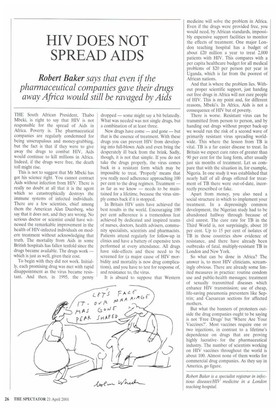HIV DOES NOT SPREAD AIDS
Robert Baker says that even if the
pharmaceutical companies gave their drugs away Africa would still be ravaged by Aids
THE South African President, Thabo Mbeki, is right to say that HIV is not responsible for the spread of Aids in Africa. Poverty is. The pharmaceutical companies are regularly condemned for being unscrupulous and money-grubbing, but the fact is that if they were to give away the drugs to combat HIV, Aids would continue to kill millions in Africa. Indeed, if the drugs were free, the death toll might rise.
This is not to suggest that Mr Mbeki has got his science right. You cannot contract Aids without infection from HIV. There is really no doubt at all that it is the agent which so catastrophically destroys the immune systems of infected individuals. There are a few scientists, chief among them the American Alan Duesberg, who say that it does not, and they are wrong. No serious doctor or scientist could have witnessed the remarkable improvement in the health of HIV-infected individuals on modern treatment without acknowledging that truth. The mortality from Aids in some British hospitals has fallen tenfold since the drugs became available. The drugs work — which is just as well, given their cost.
To begin with they did not work. Initially, each promising drug was met with rapid disappointment as the virus became resistant. And then, in 1995, the penny
dropped — some might say a bit belatedly. What was needed was not single drugs, but a combination of at least three.
New drugs have come — and gone — but that is the essence of treatment. With these drugs you can prevent HIV from developing into full-blown Aids and even bring the desperately ill back from the brink. Sadly, though, it is not that simple. If you do not take the drugs properly, the virus comes back in a resistant form which may be impossible to treat. 'Properly' means that you really need adherence approaching 100 per cent to the drug regimen. Treatment — as far as we know — needs to be maintained for a lifetime, because the virus simply comes back if it is stopped.
In Britain HIV units have achieved the best results in the world. Encouraging 100 per cent adherence is a tremendous feat achieved by dedicated and inspired teams of nurses, doctors, health advisers, community specialists, scientists and pharmacists. Patients attend regularly for follow-up in clinics and have a battery, of expensive tests performed at every attendance, All drugs have side-effects and these need to be screened for (a major cause of HIV morbidity and mortality is now drug complications), and you have to test for response of, and resistance to, the virus.
It is absurd to suppose that Western medicine will solve the problem in Africa. Even if the drugs were provided free, you would need, by African standards, impossibly expensive support facilities to monitor the effects of treatment. One major London teaching hospital has a budget of about £20 million a year to treat 2,000 patients with HIV. This compares with a per capita healthcare budget for all medical problems of $20 per person per year in Uganda, which is far from the poorest of African nations.
And that is where the problem lies. Without proper scientific support, just handing Out free drugs in Africa will not cure people of HIV. This is my point and, for different reasons, Mbeki's. In Africa, Aids is not a consequence of HIV but of poverty.
There is worse. Resistant virus can be transmitted from person to person, and by handing out drugs without proper back-up we would run the risk of a second wave of primarily resistant virus spreading worldwide, This where the lesson from TB is vital. TB is a far easier disease to treat. In Britain we expect cure rates of greater than 90 per cent for the lung form, after usually just six months of treatment. Let us compare that with the situation in, for example, Nigeria. In one study it was established that nearly half of all drugs offered for treatment of TB there were out-of-date, incorrectly prescribed or fake.
Apart from money, you also need a social structure in which to implement your treatment. In a depressingly common development, the Nigerian study had to be abandoned halfway through because of civil unrest. The cure rate for TB in the Third World is, not surprisingly, about 10 per cent. Up to 15 per cent of isolates of TB in those countries show evidence of resistance, and there have already been outbreaks of fatal, multiply-resistant TB in London and New York.
So what can be done in Africa? The answer is, to most HIV clinicians, screamingly obvious. There are already some limited measures in practice: routine condom use and public-health messages; treatment of sexually transmitted diseases which enhance HIV transmission; use of cheap, life-saving pneumonia preventers like Septrin; and Caesarean sections for affected mothers.
But what the banners of protesters outside the drug companies ought to be saying is not 'Free Drugs' but 'Where Are Your Vaccines?'. Most vaccines require one or two injections, in contrast to a lifetime's dependence on drugs that are proving highly lucrative, for the pharmaceutical industry. The number of scientists working on HIV vaccines throughout the world is about 100. Almost none of them works for commercial drug companies. As they say in America, go figure.
Robert Baker is a specialist registrar in infectious diseases/HIV medicine in a London teaching hospital.


































































 Previous page
Previous page